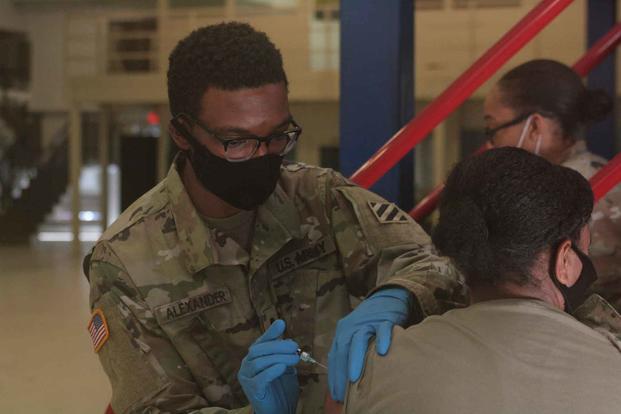You've heard it again and again in this time of COVID-19: Get your flu shot.
It's "more important than ever during 2020-2021 to protect yourself, your family and your community," public health officials with the Centers for Disease Control and Prevention have said.
But many active-duty personnel, who are required to get an influenza vaccine, have not received them -- a situation Defense Health Agency officials maintain is on track but some military leaders say is not ideal.
Read Next: Climate Change, Terrorism Top List of Challenges Facing US Military
"We're already a little bit behind. The preference would have been to get it in October," said Col. Anthony Mastalir, commander of the 30th Space Wing at Vandenberg Air Force Base in California, during a town hall meeting Nov. 6.
At Vandenberg, the medical wing was expected to receive its doses “by the end of November,” according to Mastalir. He recommended that Tricare beneficiaries, such as family members and retirees, who want a flu shot and do not want to wait, go to a Tricare network pharmacy that offers them.
“Zero copay … I encourage you to do that as soon as possible,” Mastalir said.
A spokeswoman for the Defense Logistics Agency said Wednesday that the flu vaccine contract is "on track" and the manufacturer began delivering supplies to distribution centers last week "in accordance with the terms and conditions of the contract."
The vaccine is being distributed in allotments by priority groups, explained DLA spokeswoman Michelle McCaskill.
Officials with the 86th Airlift Wing in Ramstein, Germany, said they received an initial shipment of 5,000 shots, which it administered to first responders, medical personnel and active-duty members. Another 15,000 vaccines are expected in early December.
But there may be delays, officials said.
"Higher HQ has informed base level leaders that the DLA vendor continues to experience delays in manufacturing and delivery to the DLA," wing officials said in a statement provided to Military.com.
Worldwide, influenza activity remains lower than expected for this time of year, according to the World Health Organization, with only sporadic reports across the northern hemisphere.
WHO cautioned against drawing any conclusions about current transmission rates yet, saying that the pandemic may prevent patients from being tested or seeking treatment for the flu.
Col. Ryan Mihata, commander at the 86th Medical Group at Ramstein, said that in the region, there have not been any "significant numbers of influenza in our area."
"Influenza season in Europe tends to be one or two months behind the United States," Mihata said. "The 86th Medical Group is as interested in administering the vaccine to our patient population as our patients are to receive them."
According to the CDC, influenza activity in the U.S. remains minimal, with the exception of New Mexico and Indiana, which are both reporting low to moderate numbers of cases.
By contrast, cases of COVID-19 continue to surge across the country, with 178,200 new cases reported on Wednesday and deaths surpassing 2,200 in a day -- the highest number since early in the pandemic.
More than 12.7 million people in the U.S. have been infected, and at least 260,900 have died, according to Johns Hopkins University.
DoD officials said Tuesday they are planning for distribution of a COVID-19 vaccine once it is approved, with military medical personnel likely to be among the first to receive it, based on recommendations by the CDC, the Advisory Committee on Immunization Practices and National Academies of Sciences.
"This is that we would be likely following was -- health care personnel, non-health care essential workers, adults with high risk of medical conditions, and -- adults with high-risk medical conditions and people 65 years of age or older living in long-term care facilities," said Jonathan Hoffman, assistant secretary of defense for public affairs.
An FDA committee will meet Dec. 10 to consider an emergency use authorization request by the drug companies Pfizer and BioNTech for their vaccine candidate, which has shown to be at least 94% effective in clinical trials.
The CDC maintains that there is no national shortage of the flu vaccine, despite sporadic reports of shortages in some communities.
The total number of flu vaccines available for the 2020-21 season is estimated to be between 194 million and 198 million, a 24.9% to 27.5% increase compared with the 2017-18 flu season and a 10.9% to 13.1% increase compared last season, according to the University of Minnesota.
-- Patricia Kime can be reached at Patricia.Kime@Monster.com. Follow her on Twitter @patriciakime.
Related: ‘Shots in Arms Within 24 Hours:’ Army General’s Complex Vaccine Delivery Task Takes Shape












